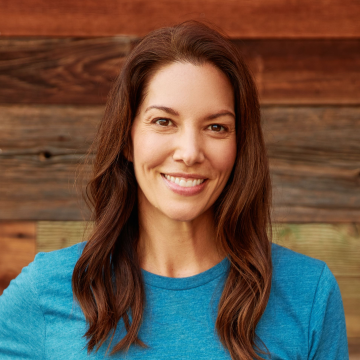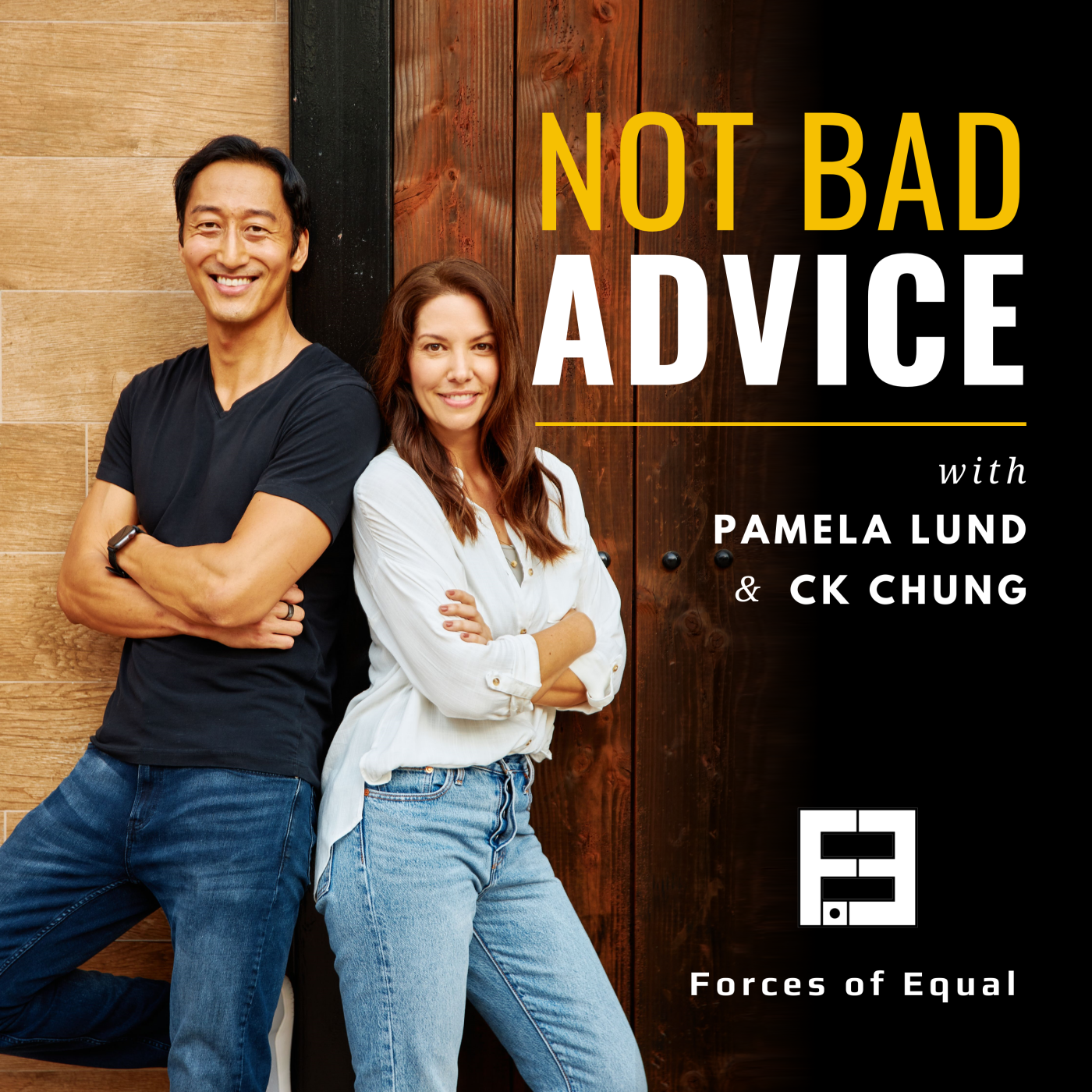Can saving $5 every month really make your life less stressful? Find out how to use micro-budgets to completely change the way you handle your expenses.
Ready to feel like you’re not bad with money? Visit NotBadWithMoney.com to learn about our financial coaching service that’s mostly practical and a little magical.
Got something you need advice about? Ask us here: ForcesOfEqual.com/Advice/
Transcript
Pam: [00:06] You’re listening to Not Bad Advice, where our goal is to offer perspective that helps you improve one aspect of your life at a time.
[00:12] I’m Pamela Lund.
CK: [00:20] And I’m CK Chung.
Pam: [00:22] And we hope that after listening you’ll think, “Hey, that’s not bad advice!”
[00:25] I budgeted for two years before I figured out the methodology behind what we’re going to talk about today. But when I did, my budget became so much more useful and powerful.
[00:48] My money stress about things like holiday shopping and car repairs completely disappeared. And yours can too, with a little thing I call micro-budgets.
CK: [00:58] So… tiny budgets?
[01:04] Basically. When people budget, they usually think about big expenses like groceries, car payments, and rent or mortgage. And that’s great. You do need to make sure you have those expenses covered. But the magic of budgeting really happens when you plan ahead for annual expenses like vacations or holiday travel, non monthly expenses like oil changes or big Costco trips, and the unplanned but totally predictable things like your car breaking down or water heater going out.
Pam: [01:33] So the basic idea is that you know that you’re going to need money in the near future for things. Some of them are certain, some of them are wishful, and some of them you hope don’t happen, but you want to be prepared for. So you look ahead to see how much you’ll need and how long you have until you need it.
CK: [01:53] So you just figure it out. How many months do you have until you need the money? And then set aside a fraction of that every month until that time you actually need it.
Pam: [02:03] Exactly. If you know you’ll need to do major maintenance on your car in three months, and you know that it will cost you about $180, you would set aside $60 each month for the next three months. So you have $180 when you need it. Even though it’s the same amount of money, it’s much easier to come up with $60 a month for three months than it is to come up with $180 in one month.
[02:29] And it’s even easier to come up with $30 a month for six months, if you plan ahead further.
CK: [02:35] Totally.
Pam: [02:37] Another example is household goods that you stock up on. Maybe you do a big Costco trip every few months or maybe you subscribe to delivery of everything, like we do. For example, we use a service called who gives a crap for toilet paper and they send us a huge box every four months. I know I need $56 for every order. So rather than having to come up with $56 every four months, I set aside $14 every month for it.
[03:06] Setting aside, $14 makes virtually no impact on how my budget feels every month, but having to find $56 in one month could be hard depending on whatever else I have going on that month. And when you get into that situation of having to come up with extra money, it’s too easy to rely on your credit card to get you through for a bit, and we all know how that turns out.
CK: [03:27] That sounds pretty minor. Is it really necessary to budget for small amounts like that?
Pam: [03:34] Yeah, I mean, maybe it sounds silly to set aside $14 for something, but most people have a lot of expenses like this. So they’ll add up. Our budget has $250 in total of micro-budgets that I set aside every month for things that we buy every few months or once a year. So these things definitely add up.
[03:53] But micro-budgets work for bigger things too. So let’s talk about annual expenses or higher ticket items that you want to save for.
CK: [04:00] Okay.
Pam: [04:01] So Black Friday is actually the first thing I started using micro-budgets for. And it was actually because CK buys a bunch of staples and supplies for the year in bulk during black Friday, so that he can save a lot by buying all at once.
[04:14] But in order to save money by buying for the whole year at once, we needed an extra $700 in the budget in November. That’s a lot to come up with at once, and that doesn’t include what I plan to spend on black Friday. So we actually need about $1,200 more in November than we spend in a normal month. That’s a lot of money to come up with in one month. But it’s only a hundred dollars a month over the course of the year because I used micro-budgets to save for it.
[04:40] So that money sits in savings, earning a tiny, tiny bit of interest, until we spend it without stress or anxiety, because we planned for it. And you can do this with anything. So let’s quickly talk about a few other examples that most people have probably experienced.
[04:56] Two episodes ago, we were talking about spending consciously, we brought up friends getting married. And if you’re in that, like 25 to 35 age range, you’re probably going to be going to a lot of weddings in the near future when we can all travel safely again. So if three of your friends get married in one year, you can end up in debt really quickly. But if you use micro-budgets so you start setting aside like 50 or a hundred dollars a month, well before anyone gets engaged, you’ll have that money available when you want it.
[05:31] And appliances are another good thing to use micro budgets for, if you have appliances that are getting old, they are going to break down and you are going to have to replace them. You have no idea when it’s going to happen, but it is someday. So you can use micro-budgets to save a little bit every month, so when your fridge eventually dies, you’ve already got the money to replace it. And the most stressful thing is eating all of the ice cream before it melts rather than putting $1,500 on a credit card. And if something else urgent comes up before you need to replace your refrigerator, you can borrow money from your fridge replacement budget instead of using a credit card.
[06:09] So no matter what happens, you’re in a better position than you would have been if you didn’t set aside a little bit of money every month. And you don’t actually have to use micro-budgets for responsible things either. You could set aside $30 a month, just so when you want to splurge on something random, you totally can without feeling guilty about it.
[06:28] It’s all about reducing month to month swings and expenses and reducing anxiety about how much you have and how much you’re spending.
[06:38] Finally, budgeting, like this comes in really handy if you have variable income, like if you get paid hourly or make commission. When you have a bigger paycheck, it’s easy to spend that extra money without planning for what will happen when you get a smaller paycheck.
[06:52] But with micro budgets, you’ll be motivated to set aside money for future expenses when you get a larger check, so you won’t be as stressed out when you get a smaller one.
CK: [07:01] Why don’t more people use micro-budgets like this already?
Pam: [07:04] Well, we’re not taught any of this stuff in school or by our parents. I don’t think that most people are taught to budget at all, much less to use advanced techniques like this. It wasn’t until I started using the software called You Need a Budget that I started even thinking about micro-budgets. And it still took me a couple of years to use them in the way I’m talking about today, because humans just aren’t good at planning for the future in general, but we’re really not good at planning for our financial future.
[07:30] So that’s where having a system that makes setting aside money easy, visible, and rewarding is key. When you can see what the money is for, because it’s sitting in a budget category named for the thing it’s going to be spent on, it’s much easier to save the money.
[07:45] If you just had $50 sitting in your checking account, that was supposed to be set aside for something you are going to buy four months from now, but you didn’t have a reminder of what the money was for, it would be really hard to not just spend it now. But now everyone listening knows about micro budget. So not knowing isn’t an excuse anymore.
[08:03] I chose from the Nocturna Oracle deck to help everyone remember today’s message about using micro-budgets to make your budget less stressful is the tide pool card. If you’ve ever seen a tide pool, they’re pretty fascinating to watch in action.
[08:48] During high tide, the tide pool fills with water and the wildlife that gets swept in with the tide go nuts, eating the plants that they only get to eat when they’re in the tide pool. And all of the wildlife that usually live in the shallow water during low tide, get fresh water and nutrients that are carried in by the high tide.
[09:06] So the high tide is the abundant time. And all of the water creatures and plants take advantage of it so that when the tide is low, they can survive.
[09:15] There’s a natural ebb and flow here just like everywhere in life, including money. So when money. flows in, use your micro-budgets to make the ebbs easier.
[09:28] If you want guidance through the process of unpacking your money stories and setting up a budget that actually works including using micro budgets, don’t forget to visit NotBadWithMoney.com to learn about our money coaching service. And if you found yourself thinking, “Hey, that’s not bad advice,” while listening today, share the show with a friend that you want to have as your budgeting buddy.
[09:53] You can get in touch with us on Twitter, where I’m @Pamela_Lund and CK is @cKdisco.
[10:00] If there’s something you need advice about, visit ForcesOfEqual.com/Advice where you’ll find a form that you can use to get in touch. Both links are in the show notes.






